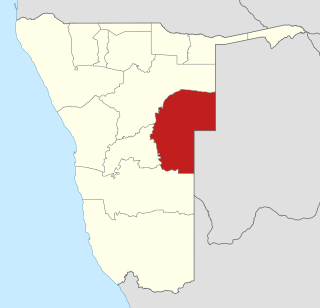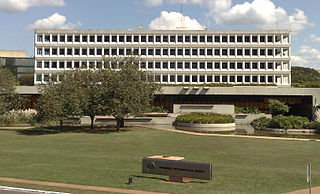Related Research Articles

Namibia, officially the Republic of Namibia, is a country in Southern Africa. Its western border is the Atlantic Ocean. It shares land borders with Zambia and Angola to the north, Botswana to the east and South Africa to the south and east. Although it does not border Zimbabwe, less than 200 metres of the Botswanan right bank of the Zambezi River separates the two countries. Its capital and largest city is Windhoek.

The Tropic of Capricorn is the circle of latitude that contains the subsolar point at the December solstice. It is thus the southernmost latitude where the Sun can be seen directly overhead. It also reaches 90 degrees below the horizon at solar midnight on the June Solstice. Its northern equivalent is the Tropic of Cancer.

The Brazilian Intelligence Agency is the main intelligence agency in Brazil. ABIN's mission is to ensure that the Federal Executive has access to knowledge related to the security of the State and society, such as those involving foreign defense, foreign relations, internal security, socioeconomic development and scientific-technological development. A successor organization to the Serviço Nacional de Informações (SNI), it formed during the government of Humberto de Alencar Castelo Branco in the mid-1960s.

Omaheke is one of the fourteen regions of Namibia, the least populous region. Its capital is Gobabis. It lies in eastern Namibia on the border with Botswana and is the western extension of the Kalahari desert. The self-governed villages of Otjinene, Leonardville and Witvlei are situated in the region. As of 2020, Omaheke had 48,594 registered voters.

The National Congress of Brazil is the legislative body of Brazil's federal government. Unlike the state legislative assemblies and municipal chambers, the Congress is bicameral, composed of the Federal Senate and the Chamber of Deputies. The Congress meets annually in Brasília from 2 February to 22 December, with a mid-term break taking place between 17 July and 1 August.
This article details the geographical distribution of speakers of the German language, regardless of the legislative status within the countries where it is spoken. In addition to the German-speaking area in Europe, German-speaking minorities are present in many countries and on all six inhabited continents.


The Palácio do Planalto in Brasília is the official workplace of the president of Brazil. The building was designed by Oscar Niemeyer in 1958 and inaugurated on 21 April 1960. It has been the workplace of every Brazilian president since Juscelino Kubitschek. It is located at the Praça dos Três Poderes, to the east of the National Congress of Brazil and across from the Supreme Federal Court.


The Monumental Axis is the central and main avenue in Brasília's city design. The avenue begins on the National Congress of Brazil building and is considered part of the DF-002 road. Its first section is known as "Ministries Esplanade", as it is surrounded by ministries buildings. Many important government buildings, monuments and memorials are located on the Monumental Axis.

Praça dos Três Poderes or Three Powers Plaza is a plaza in Brasília, the capital of Brazil. The name is derived from the presence of the three branches of government around the plaza: the Executive, represented by the Palácio do Planalto ; the Legislative represented by the National Congress of Brazil; and the Judiciary, represented by the Supremo Tribunal Federal.

The Ministry of Foreign Affairs conducts Brazil's foreign relations with other countries. It is commonly referred to in Brazilian media and diplomatic jargon as Itamaraty, after the palace which houses the ministry. Since 1 January 2023, the minister responsible is Mauro Vieira.

The Tribunal de Contas da União is the Brazilian federal audit office. It is tasked with assisting Congress in its Constitutional incumbency to exercise external audit over the Executive Branch. Its members, called ministers, are appointed by the National Congress and the President of Brazil. The TCU employs a highly qualified body of civil servants to prevent, investigate and sanction corruption and malpractice of public funds, with national jurisdiction.

Ongwediva is a town in the Oshana Region in the north of Namibia. It is the district capital of the Ongwediva electoral constituency. As of 2010 it had 27,000 inhabitants and covered 4,102 hectares of land. Ongwediva has seven churches, two private schools and 13 government-run schools. Most of the inhabitants speak Oshiwambo.

Mining is the biggest contributor to Namibia's economy in terms of revenue. It accounts for 25% of the country's income. Its contribution to the gross domestic product is also very important and makes it one of the largest economic sectors of the country. Namibia produces diamonds, uranium, copper, magnesium, zinc, silver, gold, lead, semi-precious stones and industrial minerals. The majority of revenue comes from diamond mining. In 2014, Namibia was the fourth-largest exporter of non-fuel minerals in Africa.
Kavango–Zambezi Transfrontier Conservation Area is the second-largest nature and landscape conservation area in the world, spanning the international borders of five countries in Southern Africa. It includes a major part of the Upper Zambezi River and Okavango basins and Delta, the Caprivi Strip of Namibia, the southeastern part of Angola, southwestern Zambia, the northern wildlands of Botswana and western Zimbabwe. The centre of this area is at the confluence of the Zambezi and Chobe Rivers where the borders of Botswana, Namibia, Zambia and Zimbabwe meet. It incorporates a number of notable national parks and nature sites, including Chobe National Park, Hwange National Park, and the Victoria Falls. The region is home to a population of approximately 250,000 animals, including the largest population of African Elephants in the world.

The Itamaraty Palace, also known as the Palace of the Arches, is the headquarters of the Ministry of Foreign Affairs of Brazil. It is located in the national capital of Brasília. The building was designed by architect Oscar Niemeyer and inaugurated on April 21, 1970. It is located to the east of the National Congress building along the Ministries Esplanade, near the Praça dos Três Poderes.

Kavango West is one of the fourteen regions of Namibia. Its capital and only self-governed settlement is Nkurenkuru, its governor is Sirkka Ausiku. The Region was created in 2013 when the Kavango Region was split into Kavango East and Kavango West. In the north, Kavango West borders the Cuando Cubango Province of Angola. Domestically, it borders the following regions:

The Namibian Marines Corps is the Naval Infantry of Namibia and is part of the Namibian Navy and the Namibian Defence Force.